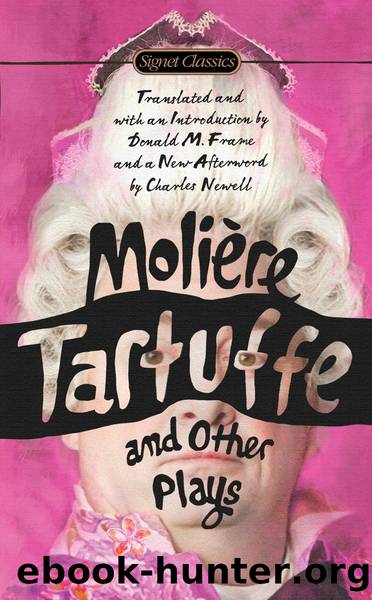Tartuffe and Other Plays by Jean-Baptiste Moliere

Author:Jean-Baptiste Moliere
Language: eng
Format: epub
Publisher: Penguin Publishing Group
Published: 2015-06-11T00:00:00+00:00
The Versailles Impromptu
THE VERSAILLES IMPROMPTU
A prose comedy in eleven scenes, first performed for the King at Versailles, October 14, 1663, and first performed publicly at the Théâtre du Palais-Royal, November 4, 1663, by Molièreâs company, the Troupe de Monsieur. The characters bear the names of the actors.
Molièreâs second critical play is again a minor one, but remarkable and fascinating. Composed on the Kingâs orders (as Molière is at pains to point out) and apparently in no more than a week or two, it is an extraordinary proof of his readiness and invention. What he does is to make his play out of the business of making a play under pressure. Thus it consists of a rather short, incomplete play-within-a-play, a kind of continuation of the Critique, that his troupe is supposed to be preparing to perform; and mainly of a quasi-documentary representation of Molière rehearsing his company. The play-within-a-play seems to serve two main functions besides that of subject or pretext for the rest: it adds the variety of a change of pace, and it makes the other, ârealâ part seem all the more real and convincing.
The main interest is in the ârealâ part, which is the nearest thing we have to an actual glimpse of Molière at grips with the myriad problems that were his life. Though any such self-portrait in a polemical piece is self-serving and thus suspect, this one has the ring of truth and is a treasured source of insights for Molière scholars. Molièreâs Molière is no idealized hero but a harassed director trying to do the job he has to do, prodding each of the rather self-absorbed individuals of his troupe into the teamwork required for a good performance. Under such stress, the attacks on him as author, even his own performance as actor, can have only minor claims to his attention. He can be irritable, as he shows in his sharp âBe quiet, wife, youâre a foolâ; though he suppresses digressiveness in others in the interest of the task at hand, he lets himself be lured, by the admiring Mlle. de Brie, into acting out his âabandonedâ plan to parody at length the pompous actors of the Hôtel de Bourgogne.
His framework allows him to tell us much that we are glad to know: how he sees his own life, his co-workers, and himself at work among them; his views, both theoretical and applied, on acting; his sense of the tactics appropriateâand inappropriateâto controversy; the place of this in his life; his attitude toward his principal critics; the obstacles offered by even the best-intentioned meddlers; and above all the constant pressure of wearing so many hats and meeting so many stiff deadlines. We may hope that it gave him some satisfaction to show the Kingâand usâjust how hard it was to do everything he did.
Download
This site does not store any files on its server. We only index and link to content provided by other sites. Please contact the content providers to delete copyright contents if any and email us, we'll remove relevant links or contents immediately.
Cecilia; Or, Memoirs of an Heiress — Volume 2 by Fanny Burney(31956)
Cecilia; Or, Memoirs of an Heiress — Volume 3 by Fanny Burney(31941)
Dialogue by Robert McKee(4401)
The 101 Dalmatians by Dodie Smith(3511)
Bound by Hatred (The Singham Bloodlines Book 2) by MV Kasi(3086)
The Art of Dramatic Writing: Its Basis in the Creative Interpretation of Human Motives by Egri Lajos(3067)
Harry Potter and the Cursed Child - Parts One and Two by John Tiffany(3044)
The Beautiful Boys: A High School NA Reverse Harem Paranormal Bully Romance (Shadowlight Academy Book 1) by Gow Kailin(2868)
Angels in America by Tony Kushner(2662)
Carrie's War by Nina Bawden(2468)
A Clockwork Orange by Anthony Burgess(2465)
Unlaced by Jaci Burton & Jasmine Haynes & Joey W. Hill & Denise Rossetti(2375)
The Femme Playlist & I Cannot Lie to the Stars That Made Me by Catherine Hernandez(2293)
Open Book by Jessica Simpson(2266)
Drama by John Lithgow(2235)
Outside Woman (BWWM Amish Romance) by Stacy-Deanne(2120)
Terrorist Cop by Mordecai Dzikansky & ROBERT SLATER(2078)
Yerma by Federico García Lorca(2070)
Leo's Desire by Sundari Venkatraman(1932)
